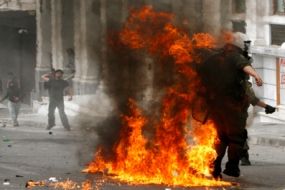THE TELEGRAPH: The attack on an Athens bank that left three dead stirred memories of the blood-spattered years of Greek civil war in the 1940s. Former correspondent Harry de Quetteville reports that many fear the violence has yet to run its course.
 When 44-year-old Marie-Therese Iatrou, who lives in a comfortable suburb outside Athens, spoke this week to her mother, Renna Nezos, she detected a note of panic in the 78-year-old's voice.
When 44-year-old Marie-Therese Iatrou, who lives in a comfortable suburb outside Athens, spoke this week to her mother, Renna Nezos, she detected a note of panic in the 78-year-old's voice."I want to come and live with you outside the city," said Mrs Nezos, whose childhood home was occupied by the Nazis and who has vivid memories of the bloodshed of the civil war that followed. "I've seen this before."
On the streets outside Mrs Nezos's window in the centre of Athens, tens of thousands of demonstrators were preparing to march against the extraordinary package of austerity measures imposed alongside the joint EU-IMF bailout that has saved the country from immediate bankruptcy.
To most observers of Greek street politics, there is nothing new, or particularly threatening, about the prospect of mass protest in this hot-blooded Mediterranean country, politically charged and potentially violent though such protest can be.
As a correspondent based for several years in Athens, I became used to the sight of demonstrators parading through the city. Stones are routinely hurled; the police routinely respond with tear gas. The British and American embassies, regular targets of demonstrators' ire, are not built like fortresses for nothing. Protests make for good television reports, before everyone forgets about them the next day.
Indeed, the very idea of protestors demanding rights and brandishing hammer-and-sickle flags (such as those draped from the Acropolis this Tuesday) can seem laughably anachronistic. Tame, almost. For years, many of Greece's wealthiest people – those in the northern suburbs of Athens with the swimming pools that they are now hiding from the taxman; those with the boltholes on Mykonos, built beautifully, but illegally, too close to the shoreline – may have regarded the man on the street with disdain, not fear. But on Wednesday that changed. >>> Harry de Quetteville | Friday, May 07, 2010